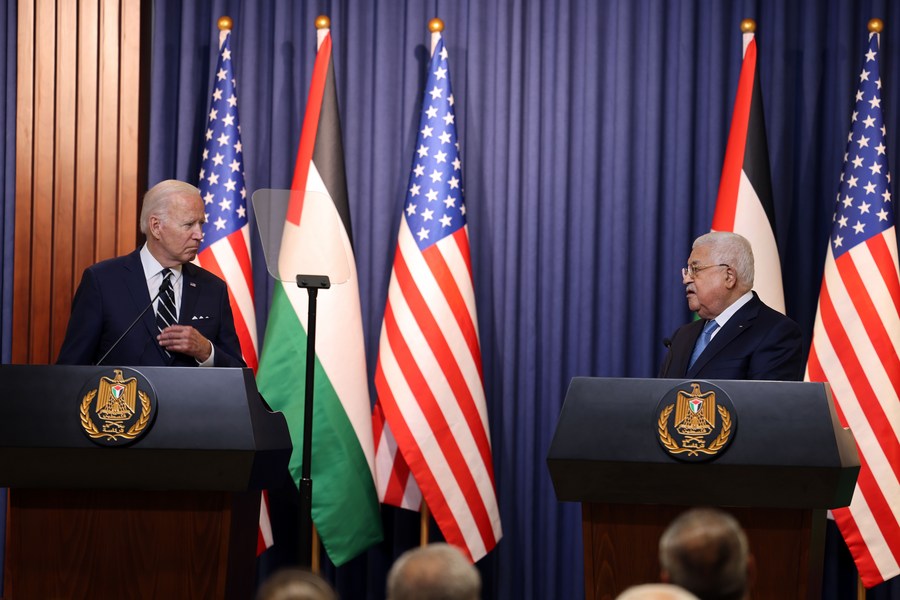Biden, Putin trips show importance of Mideast
By YIFAN XU in Washington | China Daily Global | Updated: 2022-07-18 09:03

US President Joe Biden's trip to the Middle East and Russian President Vladimir Putin's planned trip to Iran have the similar objectives of energy and weapons, according to a foreign policy and military expert.
Jack Midgley, a former adviser to the commander of the International Security Assistance Force and an adjunct associate professor in the security studies program at Georgetown University, said that the Middle East is a huge market for the US as well as Russia for oil and guns.
"What the United States is trying to do is to ensure that Saudi Arabia increases oil supplies during a time when inflation is running high in the United States, and ensure that the Saudis continue to buy US weapons, for which they are the largest buyer in the world," Midgley told China Daily.
"Putin is going to the region to make sure that the oil relationship between Iran and Russia remains sound and explore the possibility that Iranian security assistance of some kind will continue to flow to Russia," Midgley said.
During his four-day trip, which started on Wednesday, Biden visited Israel, the Palestinian West Bank and Saudi Arabia. Putin is scheduled to visit Iran on Tuesday.
Sourabh Gupta, a senior fellow at the Washington-based Institute for China-America Studies, said, "Each of the parties involved is... seeking a transactional interest, and much of that has to do with near-term oil prices."
Biden wants Saudi Arabia to open the oil spigots to push down global oil prices, thereby putting a lid on the raging inflation that is haunting his administration and Democrats in Congress, Gupta told China Daily.
The US and Saudi Arabia have maintained an alliance relationship, though the ties turned cold because of the killing of Saudi journalist Jamal Khashoggi in 2018. According to the BBC, the two countries announced during Biden's visit a package of agreements, including removing peacekeepers from a strategic island off the Saudi and Egyptian coasts and cooperation on mobile technology. However, there were no reports of the US receiving a commitment from Saudi Arabia on an oil production increase.
"So the (Biden) trip, at least with respect to oil, has been counterproductive," said Midgely.
Putin will start his trip to Iran with a trilateral meeting with Iranian President Ibrahim Leahy and Turkish President Recep Tayyip Erdogan. Russia and Iran have both been hit by sanctions and isolated by Western countries.
Midgely said there are several ways to read possible success into Putin's trip: a diplomatic win of bringing Iran and Russia closer, as well as others that support Russian actions in Ukraine; Putin may be able to shore up the energy and security relationships between Iran and Russia; and he may be signaling to the US that he has a defense interest in creating or allowing Iranian nuclear weapons and that it would complicate US policy in the region if Russian and Iranian security interests are linked.
Gupta said Putin "wants to encourage Iran to stick to its hard line on the nuclear negotiations for the time being so that a deal is not in the offing-and thereby Iranian crude, too, does not enter the global oil market, and Americans and Europeans continue to suffer from high oil prices and high inflation".
"Iran still has a great interest in getting across the line with a nuclear deal with the West and thereby receiving handsome economic dividends, Gupta added. "But after being hammered by Western sanctions for decades and adjusting to it, Teheran knows that it can wait for a deal for a couple of months or even a year or longer and thereby reciprocate their goodwill to Moscow for more or less having Teheran's back.
"In the meantime, witness the Americans and Europeans suffering from higher oil prices, which is a result of the embargoes that they have unilaterally forced on Iranian oil in the first place," Gupta said.
Midgley said that the trips are raising the temperature in the Middle East.
"The Middle East is becoming hotter with respect to the security challenges that face all the great powers," he said, adding that the US interests in the region are stability and access to oil, and the Russians want to make sure that they retain influence over world oil prices.
"I think the US has an opportunity to lower these tensions, but opportunities were not being taken (during the Biden visit). That's just not what the president is doing in the region. If anything, he's accentuating ... the tensions that already exist," Midgley said.
On the Russia-Ukraine conflict and US-Russia tension, Midgley said that the cost of the conflict has been increasing.
"So far, the United States has missed the opportunity to pursue diplomatic approaches to reduce the level of tension to try to contain the conflict," he said. It has instead "mainly provided weapons and technical assistance to Ukraine".
"It remains to be seen whether that will work, but the effect has been to increase the level of polarization and the potential for conflict in the world'" Midgley said. "So the world is a more dangerous place now than it was a few months ago."
























